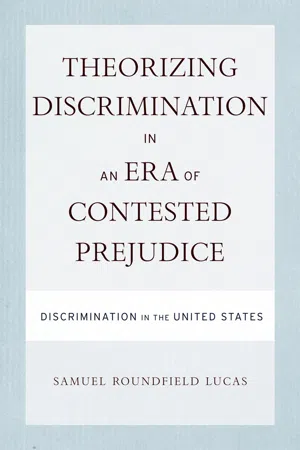
Theorizing Discrimination in an Era of Contested Prejudice
Discrimination in the United States
Samuel Lucas
- English
- PDF
- Available on iOS & Android
Theorizing Discrimination in an Era of Contested Prejudice
Discrimination in the United States
Samuel Lucas
About This Book
Despite several decades of attention, there is still no consensus on the effects of racial or sexual discrimination in the United States. In this landmark work, the well-known sociologist Samuel Lucas shows how discrimination is not simply an action that one person performs in relation to another individual, but something far more insidious: a pervasive dynamic that permeates the environment in which we live and work.
Challenging existing literature on the subject, Lucas makes a clear distinction between prejudice and discrimination. He maintains that when an era of "condoned exploitation" ended, the era of "contested prejudice, " as he terms it, began. He argues that the great strides made in the 1950s and 1960s repudiated prejudice, but not discrimination. Drawing on critical race theory, feminist theory, and a critique of dominant perspectives in the social sciences and law, Lucas offers a new understanding of racial and sexual discrimination that can guide our actions and laws into a more just future.
Frequently asked questions
Information
Table of contents
- Contents
- Acknowledgments
- Introduction: Evidently
- 1 Discrimination in the Era of Contested Prejudice: Fundamental Bases
- 2 Experiential Realities and Public Contestation
- 3 From Condoned Exploitive Relations to the Era of Contested Prejudice
- 4 Defining, Finding, and Remedying Discrimination: Dominant Legal Perspectives
- 5 Defining, Finding, and Remedying Discrimination: Critical Legal Perspectives and the Critique of the Dominant Legal View
- 6 Defining Discrimination Effects: An Asocial Scientific Method
- 7 Discrimination as a (Damaged) Social Relation
- 8 Epistemological Foundations for Studying Effects of Discrimination as a Social Relation
- 9 Theorizing Discrimination in an Era of Contested Prejudice
- Appendix A: Commentary on Methods of Data Analysis for Chapter 2
- Appendix B: Commentary on Simulation for Chapter 5
- References
- Index